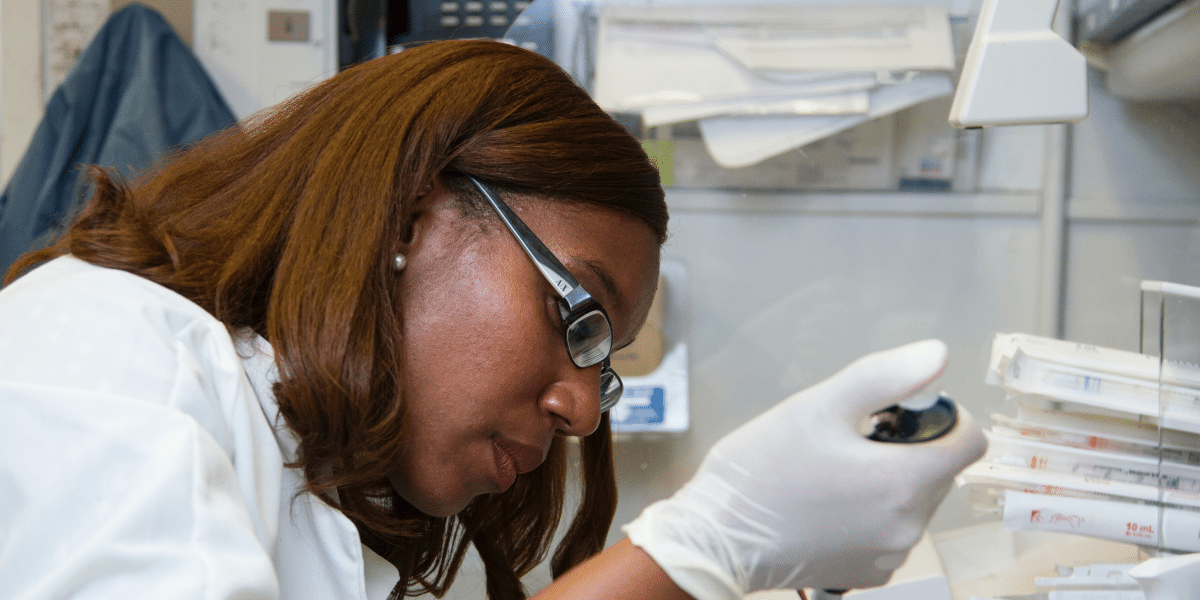Image commercially licensed from: Unsplash
The biotechnology industry is an innovative and growing sector with the potential to transform the world we live in. It is a diverse field that offers many opportunities for women to contribute their unique perspectives and skills. While the field has traditionally been male-dominated, there are many reasons to be optimistic about the prospects of women in biotech.
The Need for Diversity in Biotech
Biotechnology has the potential to revolutionize medicine, agriculture, and energy, among other fields. However, to achieve these breakthroughs, the industry needs diverse perspectives and expertise. Biotechnology is a multidisciplinary field that requires collaboration among scientists, engineers, business professionals, and others. To bring diverse perspectives to the table, the industry needs to attract and retain women and underrepresented groups.
There is evidence that diversity in the biotech industry leads to better outcomes. Studies have shown that diverse teams are more innovative, creative, and productive. Diverse perspectives can also help biotech companies develop products that are more inclusive and better meet the needs of all people.
Advancements in Biotech for Women’s Health
The biotech industry has made significant strides in developing products that address women’s health needs. For example, biotech companies have developed treatments for breast cancer, ovarian cancer, and other women’s health conditions. In recent years, there has been an increase in the number of biotech companies focused on women’s health, such as those developing treatments for endometriosis, menopause, and polycystic ovary syndrome (PCOS).
The biotech industry has also made advancements in fertility treatments. The development of in vitro fertilization (IVF) has enabled millions of couples to have children. Biotech companies are also developing new technologies to improve the success rate of IVF and to reduce the risk of complications.
Women in Biotech Leadership Roles
Women are also making strides in leadership roles in the biotech industry. In recent years, there have been many high-profile women in biotech who have led successful companies.
For example, Brandy G. Robinson, a Regulatory Affairs and Compliance Executive, is a cross-functional global team leader and professional with a strong sense of initiative who is driven to seize opportunities and take on new challenges with diverse legal, compliance, and regulatory standards expertise. She is also an exceptional public speaker and lecturer in higher education.
In 2018, she switched career paths, pivoting into the biotech industry and diligently working her way to an executive role within three years, becoming the Head of Regulatory Affairs and Compliance of a publicly traded biotech company. This achievement was not only significant in that Brandy G. Robinson is a woman achieving such executive status, but also as a woman of color. In an April 2022 Pharmaceutical Executive report, it states that in 2021, “women of color represented only 5% of biotech and 4% of pharma line roles.”
The Role of Mentoring in Supporting Women in Biotech
Mentoring is critical for supporting women in biotech. Mentors can provide guidance, advice, and support to help women navigate the industry and achieve their career goals. Mentoring relationships can also provide networking opportunities and access to resources that can help women advance in their careers.
There are many organizations that provide mentoring programs for women in biotech. For example, the Healthcare Businesswomen’s Association (HBA) offers mentoring programs for women in the life sciences industry. The Association for Women in Science (AWIS) also offers mentoring programs for women in STEM fields, including biotech.
The Importance of Work-Life Balance for Women in Biotech
Work-life balance is a critical issue for women in biotech. Like many industries, biotech can be demanding, requiring long hours and intense focus. Women in biotech may also face challenges related to family responsibilities, including childcare and eldercare.
The biotech industry can take steps to support work-life balance for women. For example, biotech companies can offer flexible work arrangements, such as remote work or flexible hours.
Companies can also offer on-site childcare or support for eldercare.
Education and training are critical components for supporting women in biotech. Biotech is a rapidly evolving field that requires professionals to stay up to date with the latest advancements and technologies. Women in biotech need access to high-quality education and training programs to develop the skills and knowledge they need to succeed in the industry.
Education and Training Opportunities
There are many education and training opportunities available to women in biotech. Universities and colleges offer degree programs in biotechnology, biochemistry, and related fields. These programs provide students with a strong foundation in the science and technology that underpins the biotech industry.
Many universities and colleges also offer graduate programs in biotechnology and related fields. These programs provide students with the advanced skills and knowledge they need to pursue careers in research and development, product commercialization, and other roles in the biotech industry.
In addition to degree programs, there are many professional development programs and training opportunities available to women in biotech. These programs can help professionals develop specialized skills in areas such as regulatory affairs, clinical trials, and manufacturing.
Professional Associations
Professional associations play an important role in supporting women in biotech through education and training. These associations offer a wide range of programs and services to help professionals develop their skills and advance their careers. For example, the Biotechnology Innovation Organization (BIO) offers a variety of educational programs, including webinars, workshops, and conferences.
The Healthcare Businesswomen’s Association (HBA) is another example of a professional
association that supports women in biotech. The HBA offers a variety of education and training programs, including a leadership development program that provides women with the skills and knowledge they need to advance their careers.
Mentoring and Networking
Mentoring and networking are also critical components of education and training for women in biotech. Mentors can provide guidance, advice, and support to help women navigate the industry and achieve their career goals. Mentoring relationships can also provide networking opportunities and access to resources that can help women advance in their careers.
Professional associations and other organizations often offer mentoring and networking programs for women in biotech. For example, the Association for Women in Science (AWIS) offers a mentoring program that connects women in STEM fields with experienced mentors who can provide guidance and support.
Supporting Women in Leadership Roles
Education and training are also critical for supporting women in leadership roles in biotech. Women in biotech who aspire to leadership roles need access to specialized training and development programs that focus on leadership skills, strategic planning, and decision-making.
Many professional associations and other organizations offer leadership development programs for women in biotech. For example, the Women’s Executive Leadership Program offered by the Healthcare Businesswomen’s Association (HBA) provides women with the skills and knowledge they need to succeed in leadership roles.
Conclusion
The biotech industry offers many opportunities for women to develop rewarding careers. However, to succeed in the industry, women need access to high-quality education and training programs, mentoring and networking opportunities, and support for work-life balance.
Professional associations and other organizations play an important role in providing these resources and supporting women in biotech throughout their careers. With continued focus and investment, the biotech industry can become more diverse, innovative, and impactful, with women playing a critical role in its success.

















